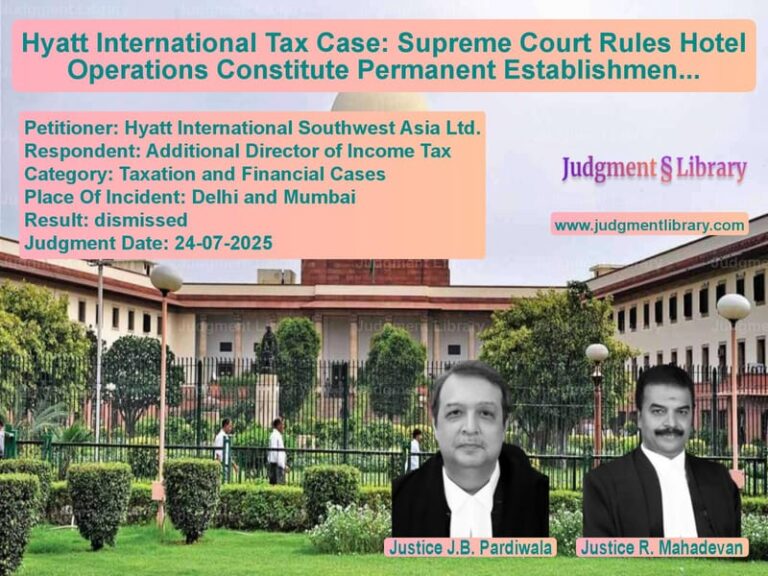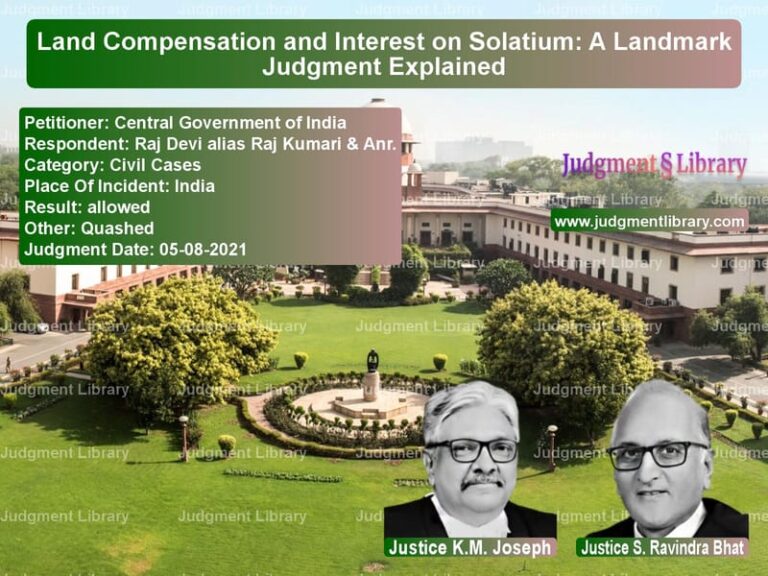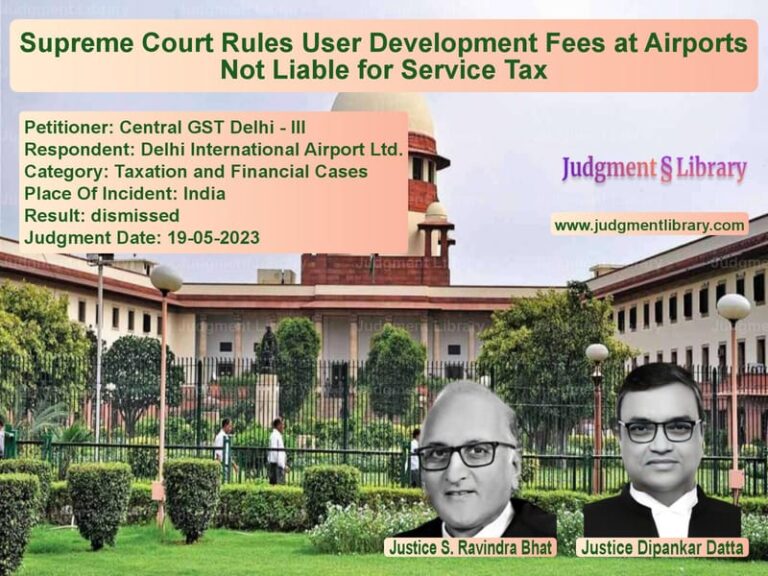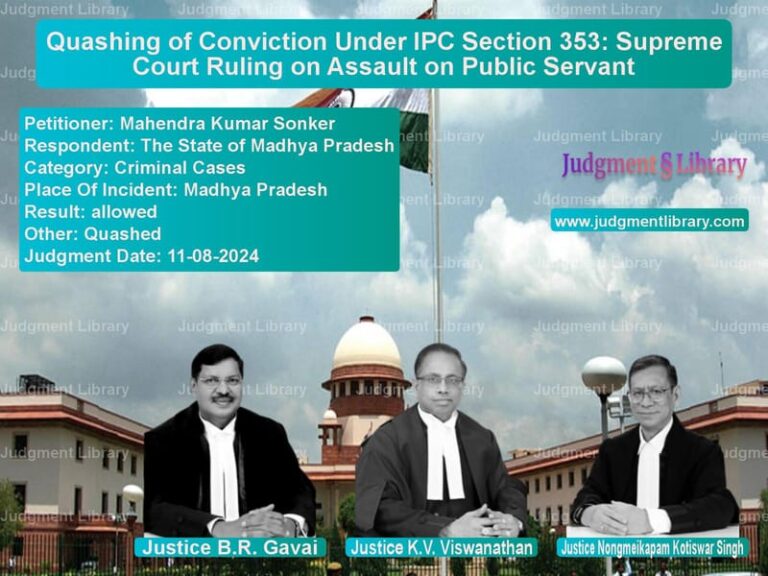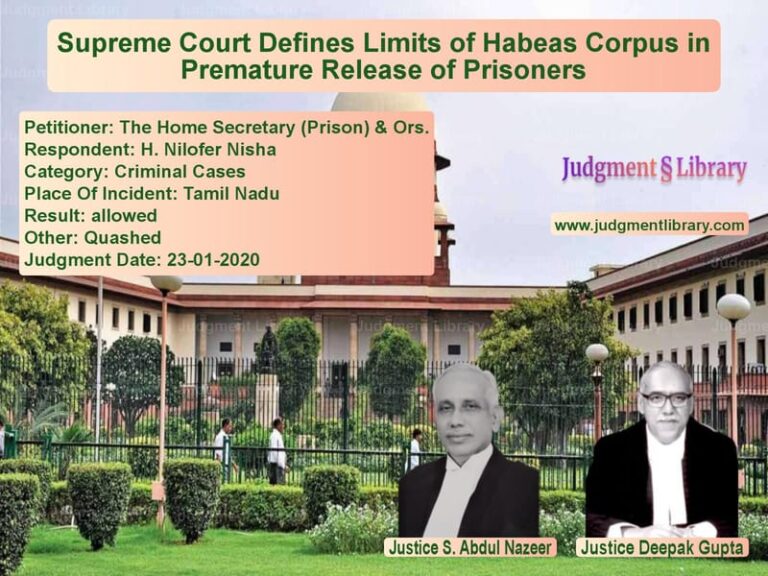Death Sentence Commuted to Life Imprisonment in Kerala Mass Murder Case
The case of M.A. Antony @ Antappan v. State of Kerala is a landmark ruling where the Supreme Court commuted the death sentence of the petitioner to life imprisonment. The case involved the brutal murder of six members of a family in the Manjooran House, Kerala, by the appellant in a bid to secure financial assistance for traveling abroad. The trial court had sentenced him to death, a decision upheld by the Kerala High Court and initially by the Supreme Court. However, in a review petition, the Supreme Court revisited the case and commuted the sentence to life imprisonment, considering socio-economic factors and the possibility of reform.
Background of the Case
The prosecution alleged that on the intervening night of January 6-7, 2001, the appellant, in desperate need of money to travel abroad, committed the murder of six members of the Manjooran family. He first killed two victims who refused to lend him money and then waited for the remaining family members, who were out watching a movie, to return home. On their arrival, he murdered them as well, ensuring that no one survived to suspect him.
Trial Court’s Judgment
The Sessions Court in Ernakulam, Kerala, convicted the appellant and awarded the death penalty on February 2, 2005. The trial judge stated:
“The cruel tendency of the accused was writ large even in the manner of attack. His conduct and behavior is repulsive to the collective conscience of society. His actions indicate a cold-blooded and premeditated approach. The murders were committed in a most cruel, inhuman, brutal, and gruesome manner, warranting the death penalty.”
The trial court justified the death sentence by concluding that the case fell under the ‘rarest of rare’ category.
High Court’s Judgment
The Kerala High Court confirmed the death sentence on September 18, 2006, stating:
“The appellant acted in the most cruel and diabolical manner. His crimes shook the conscience of society. He used every possible instrument available to ensure the victims were dead. His living in society is dangerous, and only the death penalty serves justice.”
Based on this reasoning, the High Court dismissed the appellant’s appeal and upheld the death penalty.
Supreme Court’s Initial Judgment
The Supreme Court initially upheld the death sentence in its April 22, 2009 ruling, without discussing the quantum of the sentence in detail. The court dismissed the appeal on its facts without examining mitigating circumstances.
Review Petition
The appellant filed a review petition challenging the Supreme Court’s decision. Following the landmark ruling in Mohd. Arif alias Ashfaq v. The Registrar Supreme Court of India & Others, which required an open-court hearing for review petitions in death sentence cases, the Supreme Court reconsidered the matter.
Arguments by the Petitioner
The appellant’s counsel argued:
- The case was based on circumstantial evidence, and such cases should not attract the death penalty.
- The trial court erroneously labeled the appellant a ‘hardened criminal’ without any prior criminal record.
- The possibility of reformation and rehabilitation was not considered.
- Socio-economic factors, including his extreme poverty and desperation for employment abroad, were ignored.
- The trial court relied on ‘collective conscience of society,’ which is a vague concept and should not influence sentencing.
Arguments by the Respondent
The State of Kerala contended:
- The crime was premeditated, brutal, and involved multiple murders, justifying the death penalty.
- The appellant’s actions were calculated and left no scope for leniency.
- The lower courts had already examined the possibility of reformation and concluded that the accused posed a continuing danger to society.
Supreme Court’s Observations
The Supreme Court acknowledged several critical issues:
1. Socio-Economic Factors
The Court emphasized that the socio-economic background of a convict must be considered in sentencing. It stated:
“Extreme poverty, lack of access to proper legal aid, and social background are crucial factors in determining whether a convict deserves a second chance. The petitioner was financially distressed and desperate for funds, which led him to commit the crime.”
The Court cited cases such as Sushil Kumar v. State of Punjab (2009), which recognized the role of economic desperation in criminal behavior.
2. Reform and Rehabilitation
The Supreme Court criticized the lower courts for failing to assess the possibility of reform. It observed:
“There is no material on record to show that the appellant is beyond reformation. The idea of capital punishment is to be exercised in cases where there is no alternative. Given that there is a possibility of reform, the death penalty is excessive.”
The Court referred to its ruling in Mulla v. State of Uttar Pradesh (2010), which held that courts must assess whether a convict can reintegrate into society.
3. Collective Conscience of Society
The Court questioned the reliance on the ‘collective conscience of society’ in awarding the death penalty. It reiterated the observation in Santosh Kumar Bariyar v. State of Maharashtra (2009), which warned against using this vague standard as a justification for the death penalty:
“Judges should not act as representatives of public opinion but should adhere strictly to legal principles. Public sentiment is an unreliable measure for capital punishment.”
Supreme Court’s Judgment
The Supreme Court ruled:
- The death sentence was commuted to life imprisonment.
- The petitioner’s socio-economic background and potential for reformation justified a lesser sentence.
- The case did not meet the ‘rarest of rare’ standard required for the death penalty.
Impact of the Judgment
This ruling has far-reaching consequences:
- Reforms Sentencing Standards: Courts must thoroughly assess the possibility of rehabilitation before awarding capital punishment.
- Recognizes Socio-Economic Factors: The decision reinforces the need to consider an accused’s financial and social background in sentencing.
- Limits the Use of Public Opinion: The judgment discourages reliance on ‘collective conscience’ as a basis for the death penalty.
- Ensures Procedural Fairness: The case highlights the importance of review mechanisms in death penalty cases.
Conclusion
The Supreme Court’s judgment in M.A. Antony @ Antappan v. State of Kerala is a landmark decision in India’s criminal jurisprudence. By commuting the death sentence to life imprisonment, the Court reinforced the principle that capital punishment should be imposed only in the rarest of rare cases, where rehabilitation is impossible. This ruling underscores the necessity of considering socio-economic factors, the possibility of reform, and adherence to fair sentencing principles.
Petitioner Name: M.A. Antony @ Antappan.Respondent Name: State of Kerala.Judgment By: Justice Madan B. Lokur, Justice S. Abdul Nazeer, Justice Deepak Gupta.Place Of Incident: Ernakulam, Kerala.Judgment Date: 12-12-2018.
Don’t miss out on the full details! Download the complete judgment in PDF format below and gain valuable insights instantly!
Download Judgment: M.A. Antony @ Antapp vs State of Kerala Supreme Court of India Judgment Dated 12-12-2018.pdf
Direct Downlaod Judgment: Direct downlaod this Judgment
See all petitions in Murder Cases
See all petitions in Bail and Anticipatory Bail
See all petitions in Custodial Deaths and Police Misconduct
See all petitions in Judgment by Madan B. Lokur
See all petitions in Judgment by S. Abdul Nazeer
See all petitions in Judgment by Deepak Gupta
See all petitions in partially allowed
See all petitions in Modified
See all petitions in supreme court of India judgments December 2018
See all petitions in 2018 judgments
See all posts in Criminal Cases Category
See all allowed petitions in Criminal Cases Category
See all Dismissed petitions in Criminal Cases Category
See all partially allowed petitions in Criminal Cases Category


